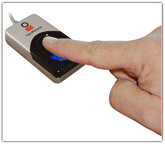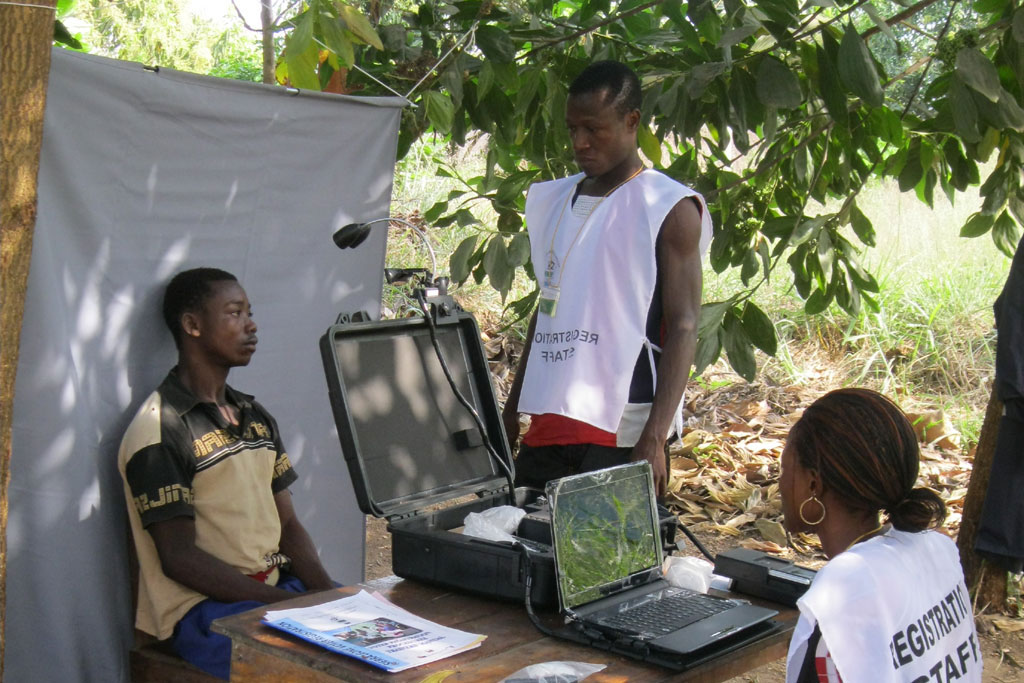Countries adopt biometrics for voter ID, fraud prevention
Nigeria, Brazil choose fingerprint to help secure elections
07 December, 2011
category: Biometrics, Government, Library
A number of countries have turned to biometrics as a solution to prevent voter fraud during national elections, and they’ve met with surprising success.
California-based DigitalPersona is assisting two countries trying to maintain fair and democratic elections. Founded in 1996, DigitalPersona started with the belief that the fingerprint reader would be the next must-have computer peripheral. While that has not yet panned out, the company has found that biometrics can “guarantee secure authentication in civil identification,” explains Chris Trytten, director of product marketing for DigitalPersona.
A fingerprint is “something you are,” says Trytten, adding that with a fingerprint you can prove you were definitely at some place at some point in time.
DigitalPersona developed a product called Civil ID to help governments identify individuals through fingerprints. According to Trytten, DigitalPersona’s Civil ID product has historically been a high-end system designed for border control, civil documents and law enforcement. However, some have started to adopt the product as a way to provide secure voting and government services by reducing fraud.
Biometrics creates an inexpensive, effective one-to-one relationship between the person and the entitlement, and don’t depend on the recipient being literate, says Trytten.
Nigeria requires biometrics for recent national elections
DigitalPersona’s Civil ID service was an instrumental part of Nigeria’s 2011 national elections. “In Africa, a lot of countries are embracing democracy,” says Trytten. Unfortunately, he explains, many do not trust the election process, and elections often lead to civil unrest or even war. “The foundation for democracy [necessitates] secure voting systems to provide results people trust,” says Trytten.
Nigeria became a democracy in 1999, but subsequent elections suffered from voter fraud as people voted more than once and ballots we cast by dead and fictitious people.
In an effort to break this cycle, Nigeria’s Independent National Electoral Commission (INEC) decided to integrate biometrics into the voter registration process.
INEC selected three vendors–Zinox Technologies, Ltd., Haier Electrical Appliances Corp. Ltd. and Avante International Technology Inc.–to provide voting registration systems. Each used DigitalPersona’s fingerprint readers to authenticate voters. The new system was used in the April 2011 national election.
To prepare for the election INEC began a nationwide voter registration drive in January 2011. DigitalPersona provided 132,000 fingerprint readers to the local and international integrators of the Nigerian Direct Data Capture System.
To register voters, INEC set up registration stations across the country. Voters gave the registrars their personal information, took a photograph and had all ten fingerprints captured. Upon completion of the registration process, voters received a photo ID card.
INEC was able to register 73 million voters across the country, nearly half of the country’s 152 million people. Those who had not enrolled were prohibited from voting.
When casting a ballot, a voter showed the card at the polling location. The registrars accessed the voter’s record, matched the face to the photograph, and captured the fingerprint. This new print template was compared to the template originally enrolled in the voting record and stored on a central database. Using the unique ID number on the photo ID card, the system is able to perform a rapid one-to-one match.
Bipartisan observers and citizens agreed that the election was fair. “It was a large event for Nigeria,” says Trytten. “There was some violence, which was to be expected, but the results were trusted and there was no civil unrest.”
The Nigerian voting system was estimated to cost $230 million.
Brazil trials biometrics in preparation for national rollout
Brazil has also embraced the use of biometric readers for voting. In 2008 DigitalPersona began working with Diebold, the electronic voting system provider, to provide its U.are.U fingerprint readers for Brazil’s elections.
The Brazilian government piloted the Diebold/DigitalPersona solution during the 2008 elections in three small cities. Based on its success, it was rolled out in all cities with populations of up to 10,000 for the 2010 election. DigitalPersona delivered 180,000 fingerprint readers in three months to meet the election deadline.
“[The Brazilian government] went to great lengths to make this transparent,” says Trytten. The process was completely audited, with a group of people who examined the software and hardware and digitally signed it to ensure its legitimacy.
Another way the Brazilian government worked to keep its elections secure was to capture the voting results locally and not via networked devices. Instead votes are stored on memory cards, which are then turned in to authorities when the election closes. “Votes can’t be intercepted over a network,” says Trytten.
While the number of Brazilians enrolled in the fingerprint system is low–only seven percent of the population–the government continues to enroll citizens. Voting is mandatory in Brazil, and if someone doesn’t vote they can be fined. Citizens receive a summons to be enrolled into the system.
Brazil plans to convert its entire voting system to electronic voting stations by 2018, says Trytten. “These systems are evolving. I see this as a work in progress,” he says.
That both the Brazilian and Nigerian elections ran smoothly is a sign of the biometrics’ success. “[In Nigeria] there were early reports of sensors not working. That was a software issue,” says Trytten. “They worked well once the bugs were ironed out. We discovered issues before the deadlines and were able to respond to them quickly.”
The Nigerian elections clearly succeeded in combating voter fraud. But Trytten says that in Brazil, “it’s hard to know what fraud was stopped, but the measure that I use is whether or not the press and community reviews deemed it a success.” He explains that there were no accusations of fraud and no recounts. “That’s a huge transition,” he says, “and by those indications, they were successful.”
Both governments were reportedly pleased with the electronic fingerprinting systems. A lot is at stake, if those involved can’t agree on election results. “We’re talking about avoiding warfare and violence … this is a tremendous step for these countries,” says Trytten.



